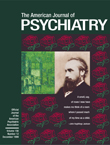A Pilot Controlled Clinical Trial of ABT-418, a Cholinergic Agonist, in the Treatment of Adults With Attention Deficit Hyperactivity Disorder
Abstract
OBJECTIVE: Despite the increasing recognition of attention deficit hyperactivity disorder (ADHD) in adults, there is a paucity of controlled pharmacological trials. Recent reports have suggested the potential usefulness of cholinergic agents for ADHD. To this end, the authors completed a controlled study of ABT-418, a novel cholinergic activating agent, for the treatment of adults with ADHD. METHOD: This was a double-blind, placebo-controlled, randomized, crossover trial that compared a transdermal patch of ABT-418 (75 mg/day) to placebo in adults who met DSM-IV criteria for ADHD. There were two 3-week treatment periods separated by 1 week of washout. RESULTS: Of the 32 subjects enrolled in the study (88% were men; mean age=40 years, SD=9), 29 completed the study. At the endpoint of each active arm (last observation carried forward), a significantly higher proportion of subjects was considered improved while receiving ABT-418 than while receiving placebo (40% versus 13%). Similarly, at endpoint there was a significantly greater reduction in ADHD symptom checklist scores (28% versus 15%). Symptoms reflective of attention, and subjects with less severe ADHD, responded more robustly to ABT-418. Treatment with ABT-418 was relatively well tolerated; dizziness and nausea were the most frequently reported adverse effects. CONCLUSIONS: The results of this investigation indicate that ABT-418, a nicotinic analog, may be a potentially useful agent for the treatment of ADHD.



